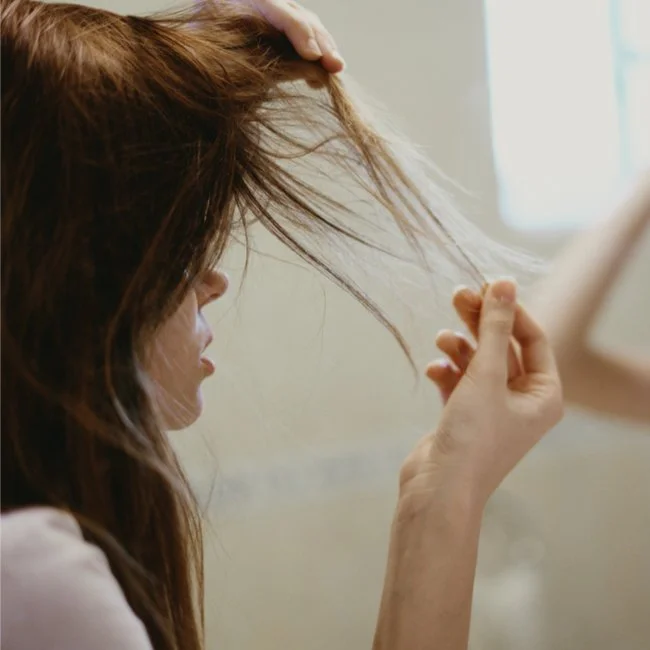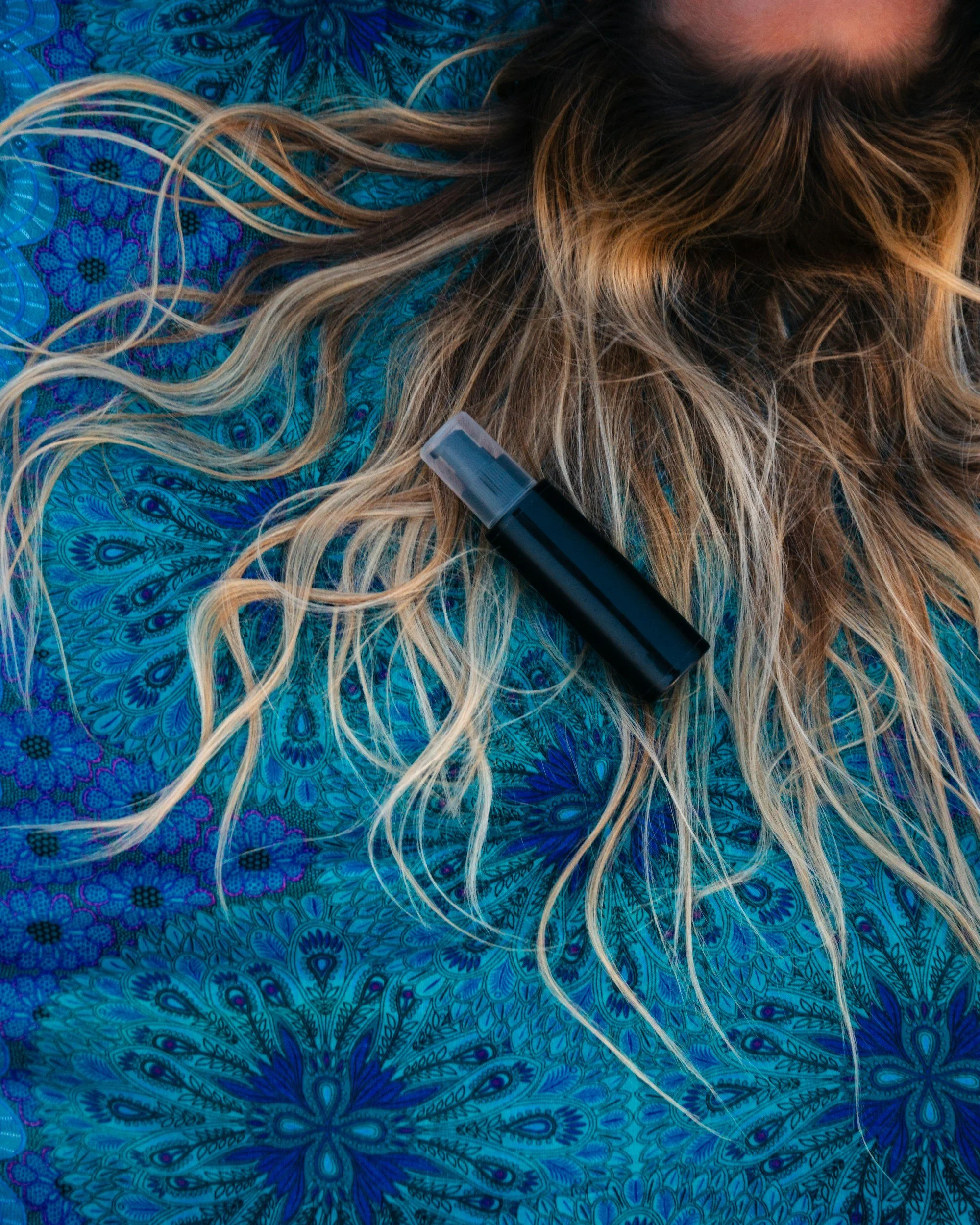
COMMON BEAUTY CHALLENGES
Thin Hair & Hair Loss
Noticing more strands down the drain? You’re not alone. Stress, lack of nutrients, and hormonal changes can all contribute to weaker roots and excessive shedding. Over time, this results in thinner, more fragile hair that struggles to grow back with strength. Supporting your hair from within can help slow the loss, rebuild natural volume, and restore a fuller, healthier look over time.
SOUNDS FAMILIAR?
“Does it feel like your hair is thinning more each day?”
Why Is My Hair So Thin? Causes & Solutions Backed by Science
Thick, healthy hair is often seen as a sign of vitality — but for many women, thin or thinning hair is a daily concern. While it’s completely normal to shed 50–100 hairs per day, persistent hair thinning or reduced volume can signal underlying imbalances in the body or environment.
Let’s break down the most common causes of thin hair in women — and the science-backed solutions that can help.
-
Your hair needs a consistent supply of nutrients to grow and stay strong. Studies show that deficiencies in the following can contribute to thinning:
Iron: Low ferritin (iron storage) is linked to hair loss, especially in menstruating women.
Zinc: Essential for protein synthesis and follicle health.
Biotin (Vitamin B7): Important for keratin infrastructure, though deficiency is rare.
Vitamin D: Helps regulate hair follicle cycling.
Protein: Hair is made of keratin, a protein — insufficient intake can slow growth.
Solution: A well-rounded diet rich in protein, leafy greens, fatty fish, and supplementation where needed can help. Blood tests can guide specific deficiencies.
-
Hormones play a key role in hair density and growth cycles.
Androgens (like DHT) can shrink hair follicles, a condition known as androgenetic alopecia (female-pattern thinning).
Thyroid issues (both hypo- and hyperthyroidism) can disrupt the hair cycle.
Postpartum and menopause are two major hormonal shifts where thinning is common.
Solution: Work with a healthcare provider to test hormone levels. Treatments may include hormone regulation, topical minoxidil, or supplements that block DHT.
-
Stress triggers telogen effluvium, a condition where hair prematurely enters the shedding phase. This often occurs 2–3 months after a stressful event (like illness or emotional trauma).
Solution: Stress management techniques — like mindfulness, exercise, and adaptogenic herbs — can support hormonal balance and scalp health. Ashwagandha and magnesium are promising in reducing cortisol levels.
-
Frequent coloring, heat tools, and tight hairstyles can damage hair shafts and irritate the scalp, leading to breakage that mimics thinning.
Solution: Embrace gentler hair care routines — air drying, sulfate-free shampoos, and scalp-friendly oils like rosemary or pumpkin seed oil, which have shown some evidence in improving hair density.
-
If thin hair runs in your family, you may have inherited a predisposition to smaller or fewer follicles.
Solution: While you can’t change your genes, you can support your follicles. Nutraceuticals like saw palmetto, marine collagen, bamboo extract, and EGCG (from green tea) have been studied for their protective effects on hair growth.
The Bottom Line
Thin hair isn’t just a cosmetic concern — it’s often a sign of what’s happening internally. By addressing nutrition, hormones, stress, and lifestyle factors, many women see improvements not only in their hair, but in their overall health and energy levels.
Remember: Hair growth is slow. It can take 3–6 months to see visible changes — but the foundation you build today will pay off in the long run.
These nutrients work from the inside out, helping strengthen hair follicles, support growth, and improve overall hair texture.
FAQs
-
Thinning hair in women can result from hormonal changes (such as postpartum or menopause), nutritional deficiencies (like lack of biotin, zinc, or iron), chronic stress, or genetics. Poor scalp health and overuse of heat styling tools can also contribute to weaker, thinner hair over time.
-
Yes, if your hair thinning is related to nutrient deficiencies or stress, targeted supplements can make a difference. Ingredients like biotin, collagen, zinc, and adaptogens like ashwagandha support healthy hair growth by nourishing hair follicles, balancing hormones, and reducing inflammation.
-
Yes. Chronic stress can disrupt the hair growth cycle and lead to a condition called telogen effluvium, where more hairs than usual enter the shedding phase. Managing stress through sleep, relaxation, and healthy habits is essential for maintaining healthy hair.
-
It depends on your scalp type, but generally 2–3 times per week is ideal. Over-washing can strip natural oils and weaken hair, while not washing enough can lead to buildup that clogs hair follicles. Use a gentle, sulfate-free shampoo and avoid hot water.
-
Yes. Tight ponytails, buns, or braids can cause traction alopecia — a type of hair loss from pulling on the scalp. Heat styling, chemical treatments, and harsh brushing can also damage hair strands over time. Letting your hair rest and using gentle styles helps prevent breakage.
READY TO GLOW?
Ultimate Beauty
Ultimate Beauty is our science-backed supplement made in Germany to support healthy skin, strong hair, and radiant nails from within.
-
Crafted to the highest standards with premium ingredients and strict quality control, because your body deserves nothing less.
-
Every capsule is powered by nutrients proven to support glowing skin, strong hair, and healthy nails—from Vitamin A to CoQ10.
-
Trusted by real women. Loved for visible improvements in skin texture, hair strength, and overall glow—naturally and effectively.
What Experts Say







